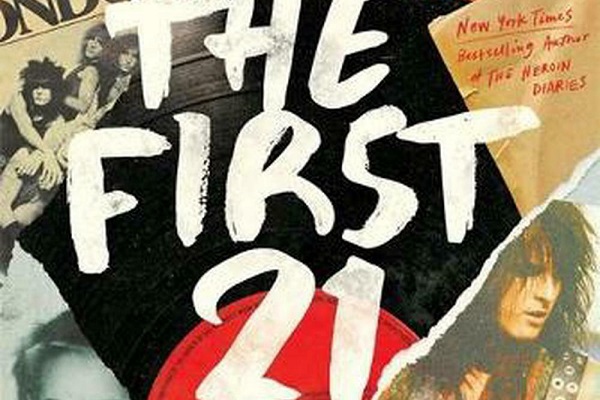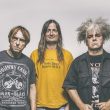Nikki Sixx of Motley Crue, Interview – How ‘The First 21’ Shaped Him

Nikki Sixx, “The First 21: How I Became Nikki Sixx” cover – Story by Anne Erickson, book cover via Hachette Books
Motley Crue bassist Nikki Sixx joins Anne Erickson for an in-depth interview to discuss his new memoir, “The First 21,” and how his wild early life help craft him into the rock star he is today
“The First 21: How I Became Nikki Sixx” (Hachette, out now) tells the story of Motley Crue bassist Nikki Sixx’s formative years, well before his Crue days, when he went by his birthname of Frank Feranna. As the story unfolds, Sixx takes readers on a highly personal, introspective journey, as he reflects on his upbringing and how those early years shaped his eventual rise to stardom with the Crue.
It’s a fascinating read, one that Sixx tells with candor and an awareness of self that few possess. Sixx caught up with Anne Erickson of Audio Ink Radio to discuss “The First 21,” how cathartic it was to write this book and what makes the member of Motley Crue family. Read the Nikki Sixx interview below, listen via the YouTube player and hear it via the Audio Ink Radio show on Apple Podcasts here and Spotify here. Keep up with Sixx here.
Anne Erickson: Congratulations on your new autobiography, “The First 21: How I Became Nikki Sixx.” This isn’t your first book. How was writing “The First 21” different from your experience with “The Heroin Diaries?”
Nikki Sixx: I’ve had a lot of opportunities to get some snapshots of my life, and I think I’m just a natural born documentarian. My whole life, I was writing notes down, couplets, triples, short stories, stream of consciousness. It’s just natural for me, because I’m such a journaling-type person. I guess a journal-er? I don’t even know if that’s a word! (Laughs) I’m open. I’m pretty open, and getting an opportunity to go back and take a new look at some of my family of origin’s storytelling on their own, which I come to find out, wasn’t all completely true, and then also being able to go, bad stuff happens to good people. Abandonment happens, and sometimes, it might be the best thing ever that happened. The fact that I got to go live with my grandparents and live in the country a lot, live on a pig farm in New Mexico and live out in the country in Idaho and explore and dream and discover music, I think it was actually a stroke of luck. But, for a long time, I could only replicate those first few years instead of being able to look at the big picture.
I wanted it to end it at turning 21 years old, and the reason for that is, yes, I changed my name when I was 21 years old to Nikki Sixx officially, but I believe everybody in their first 21 years has a moment where they go, “That’s what I want to do.” If you’re a journalist, there’s probably some moment when you’re a teenager when you’re like, I want to be a writer or an athlete or a race car driver. I really wanted to show that moment of impact for me- that coming of age, discovering the guitar and having an opportunities to come to L.A. were what defined what would become the rest of my life.
People have different ideas about how one’s early life shapes their behaviors and desires down the road. How central do you think those first 21 years were to your future and your eventual life with Motley Crue?
I think the roadmap’s in the book. A lot of people – friends and stuff I’ve read online – are saying the book is a bit of a map for success. I don’t know if I 100% agree with that, but it does show what I learned when I was very young. When you grow up in the country, and you work on the farm, and you have chores, and you have to deal with the weather, and you have to deal with the stuff you’re told to do because you’re a kid, you work hard and you don’t complain. You’re not entitled. You’re not on Instagram. You’re not on TikTok. You’re working. You work hard, and I applied that to my life, and I still apply it to my life. I love to work hard, and I love to take on projects that a lot of other people might not understand. I feel like I have the intelligence to see the end zone and win the Super Bowl before pre-season has even started, to use a football analogy, because I love football. My wife says, “If you use a football analogy one more time, I’m going to kill you.” (Laughs) I’m like, but, “Hey, don’t you understand? She’s like, “Hey, you’re not a running back.”
Would you say writing this book was cathartic at all?
One hundred percent. To be able to look honestly at something through sobriety and through having enough time on the planet, I’ve started to be able to look at things with sort of the helicopter view, gave me some different vantage points, but also the ability to kind of be empathetic. My mom was kind of a mess. My mom ran away when she was 13. She showed up at 17 with me and my dad. I mean, this is 1958. It might as well be another planet at that point. Not ’68 or ’78 or ’98. So, right out of the box, my mom was kind of beating to her own drum, and I was able to look at my mom in a way to understand that she never really matured. She had my sister in 1960, who was born with Down Syndrome. Then, about a year later, my sister was put into a home, and my dad left, and my mom left, and I ended up being raised by my grandparents.
So, instead of coming in with a Gatling gun and destroying everybody and like, “Woe is me,” it’s like, yes, they don’t get off the hook for leaving me behind, but I don’t want to carry the baggage around anymore. I was able to do that through the book. My wife says she feels like the book changed me a lot of ways- made me a lot lighter.
Did you learn anything new about yourself as you were writing this book?
That I’m not a city boy. I’m a country boy. I love the city. We lit the Sunset Strip up. We lit it on fire and started a whole music scene. We were already gone by the time the influences took seed and other bands came along, because we kind of got a fast pop, and we’re already out of here and gone. I feel more at home with blue collar people. I feel more at home with wide open spaces, and it’s because that’s how I was raised.
We lived in New Mexico. We had a trailer, and we had a big farm. We had chickens and rabbits, and I had chores. I’d take my BB gun, and it was different back then, and I would just take off in the dessert. I’d take off in the desert, and I’d dream, and we’d play games, and we’d build forts. This has been a recurring thing for me being a dreamer and a person that learned through hard work how to apply themselves to the dream, whether it’s being a songwriter or author or photographer. It doesn’t make me- I’m not as good as a lot of people, natural born talent, as photographers and writers and songwriters and bass players, but I will out work you. And I learned that from my grandparents. That’s a stroke of luck that this dysfunctional family landed me in a very poor, blue collar, traveling lifestyle. So now, we sold our house in Los Angeles, and we live in Jackson, Wyoming, and you can’t see a house from where we live. In the winter, it looks like “The Shining.” Me and my wife- I have five children, and our youngest is 2, and they live there. She’s a very creative person herself. She has a subscription-based flower company called Bouquet Box, so she’s constantly working. I finished the book. Now, I just signed a deal with a massive director. We’re forming an animation company, and me and my wife are working on a children’s book to teach people about diversity and culture. So, Wyoming, only two hours away from where I grew up in Idaho, feels like it closed the circle.
There was a tiny bit of that pre-Motley Crue life in Motley Crue’s biopic, “The Dirt.” That film was huge. Were you and the guys surprised by the success of “The Dirt?”
Well, at that time, we’d been in the game 36 years, and we’re around 40, 41 years together now. We understand the allure (of) the moth to the flame. It was accidental, but we were wired for fire and wired to fight and wired to drink and, in my case, wired to experiment with drugs. There were no repercussions from destroying hotel rooms, rolled cars, drug overdoses, jail sentences. When we survived ourselves and survived our youth, that became such a part of the culture of Motley Crue, and at times, frustrating, because we were like, “Have you heard how great the songs are that are on the new record?” People are like, “Tell me about the time!” So, we knew that was going to happen, that people wanted to watch the film for the blood and the guts, but we also knew it was an opportunity to tell a story about a family, and that’s my band. My band was my family after my family abandoned me.
What do you think is the glue that has kept Motley Crue together all these years?
God, if I know! (Laughs) I mean, honestly, I have no f***ing idea. I think we are on the plane, it’s on fire, we’re heading towards the mountain, we’re going to crash and burn and then, next thing you know, we’re on another world tour, and we’re together, and we’re getting along like brothers. Then, it changes again. We’ve been through so many versions. I think now that we’re getting older…we’re just happy to play together. (Laughs)
Earlier you mentioned that the Crue are like family. I feel like that has something to do with your longevity.
You know, probably very true. (It’s) very painful for me when the band has been on the verge of breaking up, because the band is- I threw my life into this band. I threw my life as a lyricist into this band and exposed things about myself or things that I saw in this band. I’m so lucky that I met Tommy and Vince and Mick, and they’ve changed my life, and I’ve hopefully helped changed their life. We really, maybe, changed a lot of other people’s lives, even on an entertainment level. So, yeah, the idea of Motley Crue not being in my life feels very strange.
- The Most Underrated Iron Maiden Album of All Time - July 12, 2025
- The Bands That Quietly Started the Grunge Rock Movement - July 9, 2025
- The Most Underrated Pearl Jam Album of All Time - July 4, 2025
Related Posts
- Motley Crue Reveal Bad News About Singer Vince Neil
- Motley Crue Breaks Silence About Singer’s Plane Crashing
- Beloved 1980s Rock Band Announces Las Vegas Residency
- When Your Musical Heroes Fall Short
- Could Motley Crue Avatars, Like Kiss, Happen? Nikki Sixx Comments








